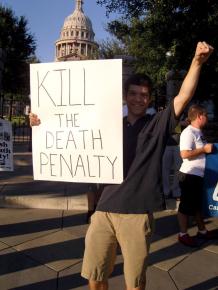Abolition in another state
of the Campaign to End the Death Penalty looks at the latest victory in the struggle against capital punishment--abolition legislation in New Mexico.
NEW MEXICO Gov. Bill Richardson signed a bill March 18 that ends the death penalty. Citing flaws in the capital punishment system and the fact that minorities are overrepresented in prison and on death row, Richardson made New Mexico the second state, after New Jersey, to abolish the death penalty legislatively since the Supreme Court reinstated capital punishment in 1977.
Richardson explained in a statement that though he supports the death penalty, he nonetheless felt compelled to sign this legislation. "I don't not have confidence in the criminal justice system as it currently operates to be the final arbiter when it comes to who lives and who dies for their crime," he said. "If the state is going to undertake this awesome responsibility, the system to impose this ultimate penalty must be perfect and can never be wrong."
New Mexico knows firsthand that the system is far from perfect. In 1974, four men--Thomas Gladish, Richard Greer, Ronald Keine and Clarence Smith--were wrongfully sentenced to death in New Mexico.

The four were convicted of kidnapping, raping and killing William Velten. They could have been executed if not for an investigation by the Detroit News, which interviewed a key eyewitness in the case who said she was coached to identify the four. In the book, The Wrong Men, Judy Weyer is quoted explaining how the chief detective in the case told her how to testify and also "promised to pay her way through secretarial school." Weyer said she was told that if she didn't comply, she would do five years in prison for perjury.
Seventeen months later, the men were freed when another man confessed to the murder.
Richardson referenced this case as well as the troubling national trend of wrongful death penalty convictions--more than 130 death row prisoners have been exonerated and freed across the country.
"It's a great time for all New Mexicans, but also for this country, as we are setting an example that there is no need for the death penalty, and it's not good public policy," said Christy Armell, an activist with the Campaign to End the Death Penalty in New Mexico. "New Mexico has spoken loud and clear, and we have chosen to become among the 14 other states that understand respect for life means every life. I am proud to be a New Mexican today."
WHILE NEW Mexico's abolition legislation is a step in the right direction, the limitations of the repeal measure should not be ignored.
For one, the two men already on death row in New Mexico will remain there--their death sentences aren't overturned by the bill.
Also, New Mexico had been one of two states in the country that didn't have a life without the possibility of parole sentence (LWOP). The abolition legislation puts it on the books. Prior to this, the harshest sentence in New Mexico besides the death penalty was "life in prison"--which meant serving at least 30 years, but having the possibility of parole at that point.
Richardson wanted to be sure his "tough on crime" credentials were front and center even as he signed this legislation. He made it known that before deciding to approve the bill, he visited the prison in New Mexico and saw the cell where a person would have to spend the rest of their life, if given life without parole. "My conclusion was those cells are something that may be worse than death," the Democratic governor said at a news conference. "I believe this is a just punishment."
While it is encouraging to see another state end the use of the barbaric and racist death penalty, its replacement with a brutal sentence of death by incarceration should also be criticized. No other industrialized country uses the death penalty or imposes harsh sentences like life without parole.
Ultimately, these "lock 'em up and throw away the key" policies need to be challenged. The solutions to the problems of violence and crime are notmore policing, more prisons and harsher sentences. We need a humane approach that instead calls for more social workers, more and better-paying jobs, youth programs, treatment for drug addiction, more resources for the foster care system--in short, measures that would tackle poverty, which is the main breeder of crime.


